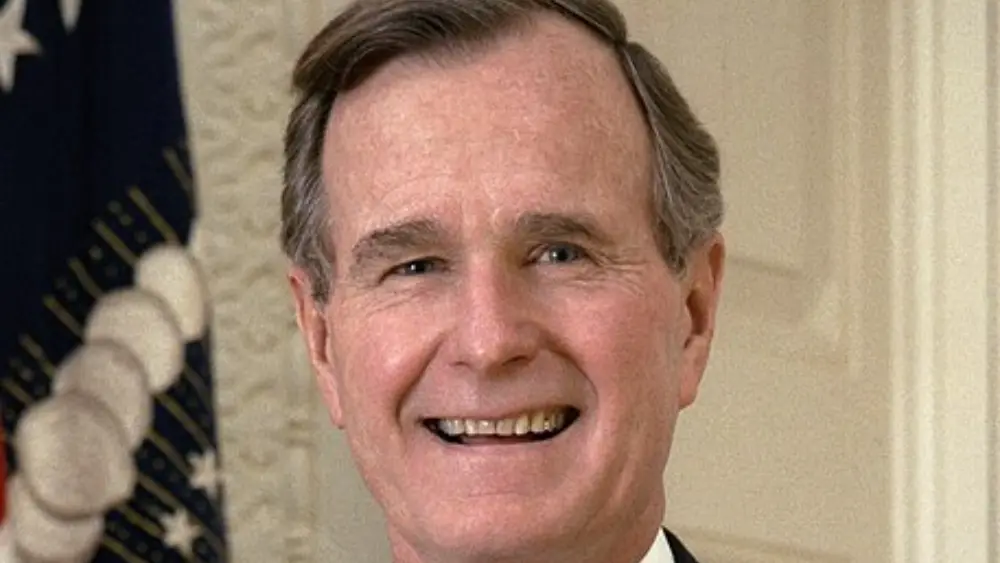George H.W. Bush, the 41st President of the United States, is remembered for his dedication to public service, statesmanship, and his contributions to American politics and foreign policy. Born on June 12, 1924, in Milton, Massachusetts, Bush’s life and career encompassed military service, diplomacy, and leadership at the highest levels of government.
Early Life and Military Service
George H.W. Bush’s early life was marked by duty and patriotism, defining his remarkable career in public service. As World War II began, Bush felt a strong call to serve, leading him to enlist in the U.S. Navy. Remarkably, he became one of the youngest naval aviators in history, a testament to his determination and courage. His Navy service showed dedication to defending the U.S. during a crucial period and laid the groundwork for future leadership.
Bush’s military service during World War II underscored his commitment to duty, honor, and sacrifice. Naval aviator experience shaped his leadership perspective, influencing his roles as a statesman and eventually U.S. President. George H.W. Bush’s early life and military service exemplified the values that would guide him throughout his distinguished career in public service.
George H.W. Bush: Post-War Education and Family
Following his valiant service during World War II, George H.W. Bush embarked on a new chapter in his life by pursuing higher education at Yale University. At Yale, he demonstrated not only his dedication to public service but also his intellectual prowess, excelling academically. It was during his time at Yale that he met Barbara Pierce, the love of his life and future wife. Their enduring marriage, spanning more than seven decades, was a testament to their deep connection and shared values.
George H.W. Bush and Barbara Pierce’s union endured time, fostering a loving family. Together, they had six children, further cementing their legacy as devoted parents and family-oriented individuals. This strong family foundation would play a significant role in shaping George H.W. Bush’s values and principles, which would later guide him through a distinguished career in public service, including his presidency of the United States.
Business Ventures and Texas
George H.W. Bush’s post-World War II years were marked by a shift towards business ventures in the oil industry, a decision that would significantly impact the trajectory of his life. This shift led him to relocate to Texas, where he immersed himself in the burgeoning oil industry. His business acumen and determination propelled him to establish himself as a successful entrepreneur in the oil business. These early ventures in the Lone Star State not only provided him with financial stability but also laid the groundwork for his eventual entry into the world of politics.
It was in Texas that George H.W. Bush began his political journey, starting as a local Republican Party organizer. His experiences in the state’s political landscape would ultimately lead him to higher office, setting the stage for his illustrious political career. Texas became the backdrop for his rise in politics, where he would go on to serve as a congressman, ambassador, and vice president before ultimately ascending to the presidency of the United States. His time in Texas marked the beginning of a remarkable political legacy. It would span decades and leave a lasting impact on American history.
George H.W. Bush: Congressional Service
George H.W. Bush’s political career took its initial steps with his election to the U.S. House of Representatives from Texas. This foray into Congress marked the beginning of his journey in national politics, where he quickly gained recognition for his thoughtful and measured approach to governance. His service as a congressman showcased his dedication to public service and his commitment to addressing the concerns of his constituents.
Following his time in the House of Representatives, Bush’s diplomatic skills and statesmanship became evident as he took on the role of the U.S. Ambassador to the United Nations. In this capacity, he navigated complex international relations and represented the United States on the global stage. His tenure as ambassador demonstrated his ability to engage with the international community and laid the groundwork for his future roles as a diplomat and, eventually, as the Vice President and President of the United States. George H.W. Bush’s congressional and diplomatic service marked the early chapters of a political career characterized by integrity, leadership, and dedication to public service.
CIA Director
In 1976, George H.W. Bush embarked on a pivotal chapter in his public service career when he was appointed as the Director of the Central Intelligence Agency (CIA). A deep commitment to national security and a keen understanding of the complexities of intelligence gathering and analysis marked his role at the helm of the CIA. During his tenure, Bush played a vital role in overseeing the nation’s intelligence efforts, navigating the challenges of the Cold War era, and ensuring that the United States remained well-informed and prepared in the face of global geopolitical tensions.
As the head of the CIA, Bush’s leadership and dedication to the agency’s mission earned him respect from intelligence professionals and policymakers alike. His service in this critical role demonstrated his ability to adapt to the evolving challenges of the international landscape and his unwavering commitment to safeguarding the interests of the United States. George H.W. Bush’s tenure as CIA Director was a testament to his expertise in matters of national security and his steadfast devotion to protecting the nation’s interests at home and abroad.
George H.W. Bush: Vice Presidency under Reagan
George H.W. Bush’s role as Vice President under President Ronald Reagan was a defining chapter in his political career. Throughout his eight years in this pivotal position, Bush played a vital role in shaping and implementing the administration’s foreign policy initiatives. His extensive experience in diplomacy and national security made him an invaluable asset to the Reagan administration as he navigated the complex landscape of international relations during the closing years of the Cold War. His steady leadership and competence garnered respect both domestically and internationally, helping to strengthen the United States’ position on the global stage.
Bush’s tenure as Vice President solidified his reputation as a capable and dedicated leader, setting the stage for his subsequent ascent to the presidency. His collaborative partnership with President Reagan and his contributions to the administration’s achievements in foreign policy left an enduring legacy that would influence his own presidency and the course of American history in the years to come.
Presidential Candidacy and Victory
In 1988, George H.W. Bush embarked on a historic journey by running for the presidency of the United States as the Republican nominee. His campaign was marked by a combination of experience, steady leadership, and a vision for the country’s future. Throughout the election season, Bush emphasized his commitment to continuity with the Reagan era while also presenting his own policy agenda. His message resonated with the American electorate, ultimately leading to his victory in the election and his inauguration as the 41st President of the United States.
As President, George H.W. Bush faced a multitude of challenges, both domestic and international, during a pivotal period in world history. His presidency is remembered for significant events such as the end of the Cold War and the Gulf War. Bush’s leadership during these times showcased his diplomatic finesse, and his dedication to preserving American interests and promoting global stability left a lasting impact on the nation’s foreign policy landscape. His victory in the 1988 presidential election marked the beginning of his distinguished tenure as President and affirmed his place in the annals of American political history.
George H.W. Bush: Domestic and Foreign Policy
George H.W. Bush’s presidency faced significant domestic and foreign challenges, requiring a delicate balancing act. He championed the Americans with Disabilities Act, emphasizing his commitment to equal rights and opportunities for all Americans at home. This act represented a significant step forward in promoting accessibility and eliminating discrimination against individuals with disabilities, leaving an enduring legacy in the realm of civil rights.
Simultaneously, Bush faced formidable foreign policy challenges during his presidency. He skillfully navigated the complex landscape of international relations, overseeing the peaceful conclusion of the Cold War and managing the Gulf War in response to Iraq’s invasion of Kuwait. His steady leadership and diplomacy played a pivotal role in shaping the post-Cold War world order and securing American interests abroad. George H.W. Bush’s presidency was defined by his ability to address significant issues on multiple fronts, both at home and on the global stage, making him a consequential figure in American history.
Statesmanship and Diplomacy
George H.W. Bush’s presidency was marked by a shining example of statesmanship and diplomacy during the Gulf War. Amid Iraq’s Kuwait invasion, Bush sought global unity to secure regional peace and global stability through international action. With skillful diplomacy, he built a wide global coalition, garnering support from allies worldwide, demonstrating his tireless dedication. UN-backed coalition showed diplomacy’s strength in addressing global crises and achieving collective security goals.
Bush’s Gulf War leadership highlighted commitment to multilateralism and skill in building strong alliances for common objectives. His actions liberated Kuwait, contained Saddam, and cemented his global statesmanship. George H.W. Bush’s Gulf War strategy showcases diplomacy and global cooperation’s enduring significance in tackling complex global issues.

George H.W. Bush: Legacy and Post-Presidential Years
George H.W. Bush, 41st President, is remembered for public service, foreign policy successes, and a vision of a “kinder, gentler nation.” Throughout his life, he exemplified the qualities of leadership, humility, and integrity. In doing so, he left a lasting mark on American history. He’s recalled for ending the Cold War, Gulf War diplomacy, and passing vital laws, including the Americans with Disabilities Act.
After his presidency, Bush remained devoted to public service and humanitarian causes, embodying his commitment to improving the world. His philanthropy, like Points of Light, promoted volunteerism and community engagement, reflecting his belief in individual power for change. George H.W. Bush’s legacy inspires future leaders, emphasizing civility, compassion, and service to others, transcending his time in office.










